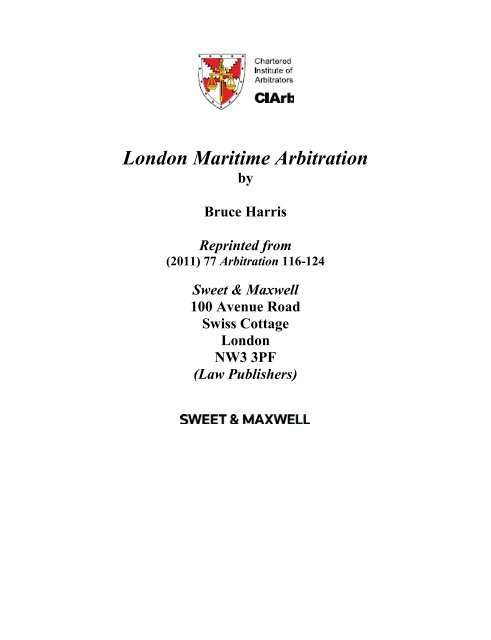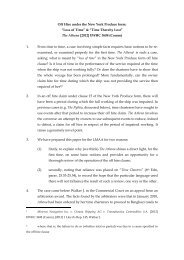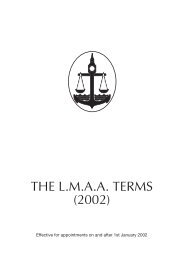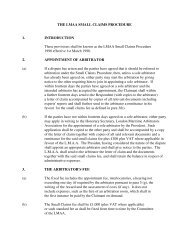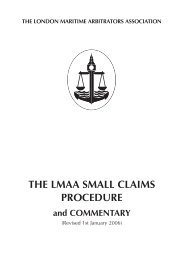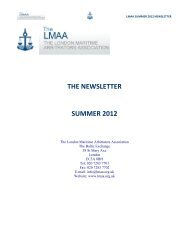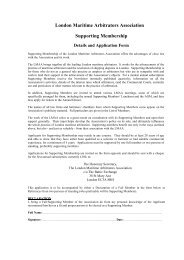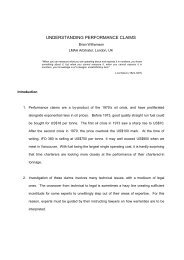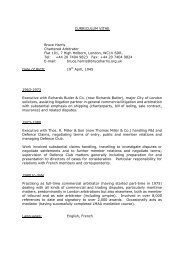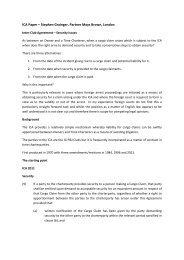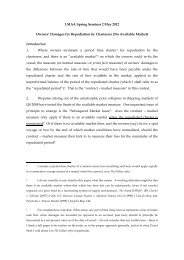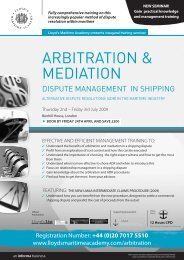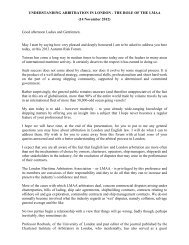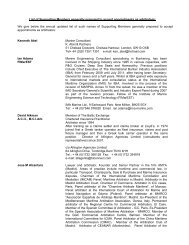Journal Article - LMAA | London Maritime Arbitrators Association
Journal Article - LMAA | London Maritime Arbitrators Association
Journal Article - LMAA | London Maritime Arbitrators Association
Create successful ePaper yourself
Turn your PDF publications into a flip-book with our unique Google optimized e-Paper software.
<strong>London</strong> <strong>Maritime</strong> Arbitration<br />
by<br />
Bruce Harris<br />
Reprinted from<br />
(2011) 77 Arbitration 116-124<br />
Sweet & Maxwell<br />
100 Avenue Road<br />
Swiss Cottage<br />
<strong>London</strong><br />
NW3 3PF<br />
(Law Publishers)
Addresses<br />
<strong>London</strong> <strong>Maritime</strong> Arbitration 1<br />
Bruce Harris<br />
<strong>London</strong>; <strong>Maritime</strong> arbitration<br />
1. Introduction<br />
I want to speak today about how <strong>London</strong> maritime arbitration works and why it works—in<br />
other words, why it is presently so apparently successful.<br />
A question often asked is “Why do so many parties choose <strong>London</strong> as the centre for<br />
their arbitration in maritime contracts” To my mind, this is not the question that should<br />
first be asked, partly because it makes an assumption. That assumption is that parties<br />
consciously make a choice when it comes to fixing a venue for arbitration. My own belief<br />
(and this is confirmed by those whose job it is to negotiate contracts, whether they be single<br />
voyage charterparties fixed at very short notice by a series of email exchanges, or substantial<br />
shipbuilding contracts) is that the arbitration clause is one of the last things, if not the last<br />
thing, to be considered, and it usually gets very little time. I think the better question to ask<br />
is “Why is <strong>London</strong> presently the dominant maritime arbitration centre”<br />
To attempt to answer that involves looking at the history of <strong>London</strong> and its arbitration<br />
work, surrounding circumstances generally, the people involved (now and in the past) and<br />
how the system works. I will take each of these areas in turn, but—as will be<br />
understood—there is quite a lot of overlap between them.<br />
2. History<br />
The first thing to say about history is that, in the expression we use in English, “history<br />
repeats itself”. The reason I mention that is because it reflects a great truth, namely that<br />
everything seems to go in cycles. We see this particularly in the fact that there seems to be<br />
a constant rise and fall in the fortunes of individuals, groups, nations and empires.<br />
Consequently, what is valid today may not be true tomorrow. The British Empire, for<br />
example, grew to be most powerful perhaps 200 or so years ago and remained a dominant<br />
world force until after the end of World War II. Then, within the space of about 20 years,<br />
it dwindled to virtual insignificance. Going further back in history, the same can be seen<br />
to be true of other empires: for example, the Roman Empire and the Ottoman Empire. In<br />
those cases too, whilst the rise to ascendancy was relatively gradual, the descent was rapid.<br />
I mention this not in any attempt to teach history, about which I know very little indeed,<br />
but because it suggests to me that whilst <strong>London</strong> may currently be in the ascendant as a<br />
maritime centre, that is a situation that may well not last. I have no idea when what I think<br />
will be its eventual decline will occur, but I am pretty sure that it will happen. That may<br />
1 An address to an International <strong>Maritime</strong> Arbitration Seminar organised by the Shanghai Sub-Commission of the<br />
China <strong>Maritime</strong> Arbitration Commission in Shanghai, June 23, 2010.<br />
116<br />
(2011) 77 Arbitration, Issue 1 © 2011 Chartered Institute of <strong>Arbitrators</strong>
<strong>London</strong> <strong>Maritime</strong> Arbitration 117<br />
give some comfort to those around the world who would like to have a larger slice of the<br />
maritime arbitration cake, and perhaps would even like to establish their own city as a<br />
primary venue for shipping arbitrations. Having said that, let me go back to my main theme.<br />
For centuries, England (or perhaps I should say the British Isles, which make up the<br />
United Kingdom, or Great Britain) was a major maritime nation. That was probably partly<br />
the effect of its being an island state, and perhaps partly a consequence of being so close<br />
to the continent of Europe, and having to protect itself against invaders, again over the<br />
course of centuries. There must, however, be other reasons, but this is not the place to<br />
investigate them. What is important is the fact that we have a long tradition of shipping,<br />
both military and commercial. Further, for centuries we were at the heart of an empire—not<br />
only a political empire but also a commercial, trading one.<br />
<strong>London</strong>, of course, became the heart of that empire, being the capital of the United<br />
Kingdom and—as the British Empire developed and grew—was at the heart of that too. In<br />
the City of <strong>London</strong>, which has long been the financial and business hub of that capital,<br />
coffee houses, which 300 years or so ago were the places where businessmen met to transact<br />
their dealings, became the focus of specific markets. For example, one became what is now<br />
the world’s major insurance market, Lloyd’s. Another became the Baltic Exchange.<br />
Now the Baltic Exchange is crucial in any story about the development of <strong>London</strong><br />
maritime arbitration. It rapidly became the world’s central market for the fixing of ships<br />
on charter. I recall in the 1960s and 1970s going to the floor of the Exchange where, on<br />
some days and at certain times, there would be hundreds of shipbrokers advertising the<br />
ships they were offering or the cargos they had for which they were seeking ships, and<br />
negotiating possible charters. That, of course, was before the modern age of information<br />
technology: nowadays so much is dealt with on computers via the internet and email, as<br />
well as on the telephone. The magnificent building which housed the Baltic Exchange from<br />
the end of the 19th century onwards was effectively destroyed by an Irish terrorist bomb<br />
at the beginning of the 1990s. The Exchange has never since regained its standing, but the<br />
truth is that it was already substantially in decline before the building was hit, largely because<br />
of the advent of IT.<br />
Most charterparty fixtures in the world were, at least until late in the 20th century, fixed<br />
on the Baltic Exchange. Inevitably, therefore, <strong>London</strong> had the most experienced and busiest<br />
shipbrokers at its heart. It is also worth noting that the motto of the Exchange is “Our Word,<br />
Our Bond”. Put another way, integrity of dealings has always been at the heart of shipbroking<br />
in <strong>London</strong>.<br />
Now the story goes that if two parties to a fixture fell into dispute, in the old days (i.e.<br />
perhaps, until the 1950s) it was normal for the brokers representing those parties to try to<br />
reach an agreed recommendation to put to their principals. If they could not do that then—so<br />
the story goes—they would ask a senior broker for his opinion. That opinion they would<br />
then put to their principals as a joint recommendation. It is said that this is what gave rise<br />
to Baltic Exchange maritime arbitration. Whether or not this is true (and it is undoubtedly<br />
somewhat romantic, particularly when the suggestion is made—as it often is—that the<br />
discussion with the third experienced broker would take place at the bar, over a gin and<br />
tonic or two) it is certainly the case that the Exchange maintained a list of brokers who were<br />
willing to act as arbitrator, and this list was displayed on the notice board on the floor of<br />
the Exchange.<br />
If a dispute arose then, following the wording in most charterparty arbitration clauses,<br />
each of the parties would appoint an arbitrator, probably from the Baltic list. Those arbitrators<br />
would then seek to agree, but if they could not (and this was quite common) they would<br />
appoint a third person usually as “umpire”. In English law, an umpire becomes the sole<br />
arbitrator once the party-appointed arbitrators have disagreed, and he alone makes the<br />
decision. This left the party-appointed arbitrators free to advocate their appointers’ cases<br />
in front of the umpire, which they would often do.<br />
(2011) 77 Arbitration, Issue 1 © 2011 Chartered Institute of <strong>Arbitrators</strong>
118 Arbitration<br />
Nowadays, the concept of the arbitrator-advocate seems a strange one to us. That is<br />
partly because, due to some changes in shipping practices and in English arbitration law,<br />
the umpire is nowadays almost unknown, having been replaced by a third arbitrator who<br />
acts in conjunction with the other two arbitrators. It is also partly because the recent and<br />
present generations of arbitrators, unlike some of their predecessors, do not seek to take<br />
any position in relation to the disputes on which they have to adjudicate other than that<br />
which seems to them to be correct on their understanding of the evidence and the law.<br />
In 1960, arbitrators whose names were on the Baltic list decided to form themselves into<br />
an association—the <strong>London</strong> <strong>Maritime</strong> <strong>Arbitrators</strong> <strong>Association</strong> (<strong>LMAA</strong>). Some of you will<br />
know that the <strong>Association</strong> has just celebrated its 50th anniversary with a very successful<br />
one-day conference and a dinner attended by more than 675 people in the heart of the City<br />
of <strong>London</strong>. I shall talk more about the <strong>LMAA</strong> shortly.<br />
Another consequence of the fact that Britain was at the heart of commerce and maritime<br />
activity was the creation, hundreds of years ago, of a specialist Admiralty Court to deal<br />
with shipping matters. In those days the problems with which the court was faced were<br />
predominantly to do with matters such as collisions, salvage, cargo damage, crew’s rights,<br />
bottomry bonds, general average and the like, but commercial contractual disputes also<br />
turned up from time to time.<br />
Towards the end of the 19th century, it became apparent that a great deal of commercial<br />
(and particularly shipping) work was coming to the English courts and that it required<br />
specialist attention. Indeed, in one case, the Court of Appeal was extremely rude about one<br />
judge who did not have the relevant experience, and who made a complete mess of a<br />
commercial dispute he had to decide. Accordingly, a specialist Commercial Court was set<br />
up. That marked something of a turning point for the development of English commercial<br />
law, since it seems to have attracted to <strong>London</strong> a large number of litigants from overseas.<br />
Nowadays the court has available 16 specialist judges, of whom at any one time about half<br />
will be sitting hearing commercial disputes. It is perhaps necessary here to explain that<br />
English judges are not trained as professional judges, but rather come from the ranks of the<br />
Bar where they have worked as advocates, usually for 25 years or more. Those who sit as<br />
commercial judges will have had very considerable experience at the Commercial Bar. The<br />
English Commercial Court now enjoys a reputation which I believe to be second to none<br />
in the commercial world at large.<br />
One more matter of history (although I do not pretend to have covered every single<br />
element): after the end of World War II there was a huge expansion of international trade<br />
which, inevitably, meant a huge expansion in maritime activity around the world. At that<br />
time, because of the importance of Lloyd’s, the Baltic Exchange, the P&I Clubs that had<br />
developed in the United Kingdom, the commodity trade associations which had established<br />
themselves in <strong>London</strong> and similar factors, <strong>London</strong>’s position at the centre of this trading<br />
world was immeasurably strengthened.<br />
3. Circumstances<br />
I have already indicated that there is inevitably an overlap between the various headings<br />
that I have identified, and this is where the first obvious example occurs. The circumstances<br />
that presently prevail and in which <strong>London</strong> finds itself as the premier centre for maritime<br />
arbitration in the world, are of course derived from the matters of history to which I have<br />
referred. And because history is a continuum, those considerations still apply, although<br />
sometimes with a different force from that which they previously had.<br />
As it seems to me, the reasons why <strong>London</strong> is now the predominant centre of maritime<br />
arbitration are (leaving on one side the fact that I believe <strong>London</strong> is chosen almost<br />
automatically in many instances when contracts are being negotiated, without much thought<br />
(2011) 77 Arbitration, Issue 1 © 2011 Chartered Institute of <strong>Arbitrators</strong>
<strong>London</strong> <strong>Maritime</strong> Arbitration 119<br />
being given to any alternatives) that it still has a huge maritime community, that English<br />
law and lawyers are—in the field of shipping at least—second to none, and that the integrity<br />
of its processes and practitioners is—quite rightly—seen to be beyond question.<br />
4. People<br />
As in any field of human endeavour, people, and their experience, skills and knowledge,<br />
are crucial. I have already, in effect, indicated in general terms some of the significance of<br />
the <strong>London</strong> maritime community (or perhaps I should say communities, given the different<br />
professions involved). Let me now focus in particular on two categories of people who are,<br />
in my opinion, of the greatest importance in the context in which I speak, namely lawyers<br />
and judges on the one hand and arbitrators on the other. I have already explained that our<br />
judges are experienced practising lawyers before they become judges and, in the case of<br />
commercial—and more particularly shipping—matters, they will invariably have had<br />
considerable experience as practising lawyers in dealing with cases within this speciality.<br />
Not only will they have had that experience, but they will have been trained by other senior<br />
lawyers who, before them, had such experience themselves.<br />
When nowadays I encounter some quite senior advocates arguing cases in front of me,<br />
I can see (because I know their histories) an unbroken line stretching back five or six<br />
generations to other advocates who were doing the same kind of work and whom I knew<br />
when I first came into this area of activity over 45 years ago. (Many of those I first knew<br />
went on to become judges. Some of them went on to the Court of Appeal and the House of<br />
Lords, and have now retired!) Obviously, those I first knew 45 years or more ago had<br />
themselves been trained by others who in turn came from similar long, unbroken lines of<br />
shipping and commercial legal experience. The value of this cannot be over-estimated. It<br />
means that the handling of cases by the lawyers involved is first-class. It also means that<br />
the judges who have to decide any such cases are of the highest standard.<br />
I have mentioned advocates, but of course in our system we have a divided profession<br />
of advocates (barristers) on the one hand, and solicitors—who prepare cases but do not,<br />
generally, advocate them—on the other. What I have said about barristers is equally true<br />
for solicitors.<br />
The question may arise as to what, in the context of arbitration, is the importance of<br />
judges. I shall address that a little later when I talk about processes in <strong>London</strong> maritime<br />
arbitration, but at this stage let me just say that it is, in my view, one of the great features<br />
of <strong>London</strong>’s attractiveness.<br />
At this stage, though, I am dealing with people, not processes. Having mentioned judges<br />
and lawyers, let me talk a little about arbitrators. In the 1940s and 1950s, as I understand<br />
it, most of those who practised as maritime arbitrators were concurrently shipping brokers<br />
who worked on the floor of the Baltic Exchange. I myself remember hearing names such<br />
as Browne, Bunker and Conybear; none of whom I knew. In the 1960s there were still many<br />
brokers and commercial people working as arbitrators, but now they began to be joined<br />
first by one Richard Clyde, a solicitor who had just retired, and later by people such as<br />
Cedric Barclay, who was principally an engineer and shipowner, and Donald Davies, who<br />
had been a mariner and had then qualified as a lawyer. By this time the amount of arbitration<br />
work—no doubt due to the huge expansion in trade I have already mentioned—had increased<br />
substantially and the types of case became more varied. I suspect this is one reason why a<br />
different type of person began to be involved as arbitrator.<br />
In those days there was not a great deal of immediate involvement of lawyers in <strong>London</strong><br />
maritime arbitration. Many cases were dealt with on a very low-key basis. Submissions to<br />
arbitrators would commonly be made by brokers on behalf of their principals, or other<br />
non-legal representatives. Lawyers might have been consulted, but any involvement they<br />
(2011) 77 Arbitration, Issue 1 © 2011 Chartered Institute of <strong>Arbitrators</strong>
120 Arbitration<br />
had was often in the background. The parties’ lay representatives communicated directly<br />
with the arbitrators by letter. By and large, everything was relatively simple, quick and very<br />
cheap.<br />
Towards the end of the 1960s, however, lawyers began to be involved more and more.<br />
There were various reasons for this. One was that cases were becoming more complicated<br />
generally. Another was that brokers and agents began to focus more on concluding contracts,<br />
and less on dealing with the disputes that arose afterwards. In addition, P&I Clubs which,<br />
until then, had often handled arbitration submissions for their members, began to employ<br />
outside lawyers more frequently. An inevitable consequence of the involvement of lawyers<br />
was increased procedural complexity. In the first place, lawyers are accustomed to court<br />
procedures and so the informality of arbitration was unfamiliar to them and, as they saw it,<br />
largely undesirable. They attempted to impose the procedures with which they were familiar<br />
from the courts upon commercial arbitration. Lawyers are also naturally cautious and do<br />
not want to risk being criticised for not having done something it might be thought they<br />
should have done. This, too, means that they tend to indulge in procedural arguments which<br />
might otherwise not have occurred.<br />
Thus the practice of maritime arbitration itself became more complex and, in time, the<br />
nature of those who became appointed as arbitrators changed. More and more people, such<br />
as myself, who had some legal experience (and, in other cases, legal qualifications as well)<br />
started to be appointed. Not only was this thought to be desirable in order to deal with the<br />
increasing procedural complexities, but I believe that the parties’ lawyers—who have a<br />
considerable say in choosing arbitrators—generally felt, and feel, more comfortable with<br />
a tribunal made up of arbitrators who have some legal knowledge and who, thus, are<br />
perceived as being more likely to reach a result that is correct in law rather than what might<br />
be called a “purely commercial” outcome (which lawyers often see as being “arbitrary”).<br />
And so it is that many of today’s maritime arbitrators in <strong>London</strong> have, to a greater or<br />
lesser extent, legal backgrounds and often legal qualifications. Two of our recent past<br />
Presidents were once themselves practising solicitors, and four of them have at some stage<br />
worked with P&I Clubs (which are quasi-legal for these purposes) and are legally qualified.<br />
On the other hand, it has to be said that a very substantial number of our arbitrators continue<br />
to come from the purely commercial or practical world, and that is all to the good.<br />
5. Integrity<br />
In any judicial system, whether it be public or private, integrity is obviously of the highest<br />
importance. <strong>London</strong> maritime arbitrators have an excellent—and I consider wholly<br />
deserved—reputation in this regard.<br />
One of the ways in which integrity is ensured is found in the fact that all arbitration in<br />
England is subject—but only where necessary—to court supervision. I emphasise “only<br />
where necessary” because, as a matter of policy, English law regards arbitration as being<br />
a private, consensual process, and considers that the courts should only intervene in order<br />
to support it and to make sure that nothing goes wrong. The courts are not there to substitute<br />
their own views or decisions for those of arbitrators, save in very rare circumstances.<br />
Our courts may intervene in three main areas. One is in connection with the question<br />
whether an arbitration tribunal in fact has jurisdiction or not. Conceptually, English law<br />
holds that this is a decision that cannot finally be made by the tribunal whose jurisdiction<br />
has been challenged. Having said that, however, our Arbitration Act does allow arbitrators<br />
to make decisions on their own jurisdiction, and those will be final and binding unless<br />
challenged in the courts within a relatively short space of time after a decision is made.<br />
A second area of challenge arises if there is a “serious irregularity” in the conduct of the<br />
arbitration proceedings. I will not go into details here as to what amounts to a “serious<br />
irregularity”. Let me just say that the emphasis is, rightly, on “serious”, and that our Act<br />
contains a list of categories of such irregularity. That list not only emphasises the seriousness<br />
(2011) 77 Arbitration, Issue 1 © 2011 Chartered Institute of <strong>Arbitrators</strong>
<strong>London</strong> <strong>Maritime</strong> Arbitration 121<br />
required, but it is also a “closed” list which cannot, therefore, be added to by the judges.<br />
The underlying principle is that, the parties having chosen their tribunal, they should live<br />
with how it works and what it decides, unless things go very seriously wrong.<br />
The third way in which the court may intervene in an arbitration—although it very rarely<br />
does so—is to correct a mistake of law committed by an arbitration tribunal. Again, I will<br />
not go into details: it is enough to say that in order to have an award reviewed on a question<br />
of law, the court has first to give permission. In order to give permission, it must effectively<br />
be persuaded, on a quick perusal of the award, that there is a very strong case for thinking<br />
that the arbitrators have made a mistake. If that is not so, then permission to appeal will not<br />
be given. Even when permission is granted, and this happens in very few cases indeed,<br />
there is no guarantee that when the court hears the appeal it will decide that the award was<br />
wrong. Nonetheless, whilst the court will be persuaded to intervene—whether on a question<br />
of jurisdiction, irregularity or law—in very few cases, the fact that it has the power to do<br />
so when necessary helps to ensure that the process of arbitration as conducted by arbitrators<br />
maintains its integrity.<br />
In any event, the arbitrators themselves deal with the matters that come to them with<br />
complete impartiality. As a result, probably 90 per cent of the awards we make are<br />
unanimous. This may be contrasted with other arbitration forums where dissents are very<br />
common and, strikingly, the dissent is always in favour of the party that appointed the<br />
arbitrator who dissents.<br />
I have also had the experience in one case of an arbitrator from another country (i.e. not<br />
the United Kingdom) telling me, quite frankly, that he “could not” agree with me and our<br />
chairman, not because he did not think that I was right, but because to agree with me would<br />
threaten at least his professional standing, and possibly even his liberty, in his home country.<br />
That is not something that happens with <strong>London</strong> arbitrators. I have also heard it said in one<br />
major shipping centre of the world, which itself is anxious to become a centre of maritime<br />
arbitration, that none of the parties based in that centre would arbitrate there because they<br />
could not trust the arbitrators, their own nationals!<br />
As an illustration of how indifferent <strong>London</strong> arbitrators can be to the question of who<br />
appointed them, I remember one arbitration that I chaired where, after a hearing with much<br />
evidence and argument, the party-appointed arbitrators discussed the matter and disagreed<br />
quite strongly with one another. At one point I laughed, because I suddenly realised that<br />
their points of view were diametrically opposed to the points of view of the parties that had,<br />
respectively, appointed them. Thus the arbitrator appointed by party A was adopting the<br />
position of party B, and vice versa.<br />
6. How <strong>London</strong> <strong>Maritime</strong> Arbitration Works<br />
<strong>London</strong> maritime arbitration is often equated with the <strong>LMAA</strong>. This is understandable<br />
because in many respects the <strong>LMAA</strong> is the public face of <strong>London</strong> maritime arbitration, but<br />
in fact there is an important point to be understood which relates to the difference between<br />
the <strong>LMAA</strong> and the way arbitrations are organised in many other places. The <strong>LMAA</strong> is not<br />
an administering body or an appointing authority (although in a very small number of cases<br />
it will make appointments, or nominate arbitrators or mediators). So it is quite unlike CMAC<br />
or other administering arbitration bodies, such as the ICC. As its name tells us, the <strong>LMAA</strong><br />
is purely an association of <strong>London</strong> maritime arbitrators. It does publish Terms to govern<br />
the conduct of arbitrations which are being run by its members, but it does not administer<br />
the arbitrations in any way. The administration of arbitrations is done by the individual<br />
tribunals involved. Whilst they normally apply the Terms, it is up to them whether they<br />
want to apply them in every single respect or whether they want to be flexible and vary<br />
them according to the case.<br />
(2011) 77 Arbitration, Issue 1 © 2011 Chartered Institute of <strong>Arbitrators</strong>
122 Arbitration<br />
I cannot over-emphasise the importance of this difference. Indeed, the fact that <strong>London</strong><br />
maritime arbitrations are not administered may be one of the reasons why <strong>London</strong> is found<br />
to be attractive. Certainly, the IMAO, an organisation set up some years ago between the<br />
ICC and the CMI to provide an international court of maritime arbitration, has been a<br />
singular failure. It is plain that shipping parties do not want administered arbitration. I can<br />
understand why, because it tends to be slow, expensive and burdened with unnecessary<br />
bureaucracy.<br />
So how does it work The first thing to consider is the question “How does an arbitration<br />
get started” In most cases, where the arbitration clause provides for each party to make an<br />
appointment, the arbitration starts when one party appoints its arbitrator and gives notice<br />
of that appointment to the other party. (It is important to note here that an appointment is<br />
only valid and complete when the arbitrator in question has agreed to accept appointment,<br />
and when notice of that appointment has been given.) In other cases, where the arbitration<br />
agreement provides for a sole arbitrator, the arbitration will be considered to have started<br />
when one party calls upon the other to agree upon a sole arbitrator. But the more normal<br />
clause provides for each party to make an appointment, and the tribunal is then complete<br />
when the second party appoints its arbitrator. If it does not do so within a specified time,<br />
then there are provisions in English law (and sometimes in the arbitration clause) allowing<br />
the first party to appoint its arbitrator as sole arbitrator, and that arbitrator alone thereafter<br />
acts and makes the decision.<br />
Once arbitration has been started, the policy we adopt is that each party’s cards should<br />
be put squarely “on the table”. In other words, the parties are not allowed to “play poker”,<br />
to hide things from one another or to surprise one another late in the proceedings. Thus the<br />
claimant starts things moving by serving claim submissions together with supporting<br />
documents. Those submissions have to explain what the claim is about and why the claimant<br />
says it is entitled to succeed, on the facts, and on the law if relevant. They should be relatively<br />
full and not, as in the past, short, formal pleadings. The respondent then replies with its<br />
defence submissions. These again should be full, and should clearly and fully state what<br />
the respondent’s case is, and should be supported by relevant documents from its side.<br />
After that, it is common for the claimant to put in reply submissions, perhaps with some<br />
more documents, but hopefully not. If at that stage there is any question that the parties<br />
may still have further documents that are relevant that should be disclosed, there is a<br />
procedure for disclosure. At this point it is normal to look at the case to see whether it is<br />
one that requires an oral hearing, at which lawyers will argue and witnesses will probably<br />
give evidence, or whether it can be dealt with on documents alone.<br />
Parties do not have an automatic right to have an oral hearing. The question whether<br />
there is to be one or not is decided by the arbitrators alone. The kind of factors that influence<br />
us in deciding whether to hold an oral hearing are, for example, whether there are issues of<br />
credibility (who said what to whom and when, for instance), issues of technical complexity<br />
where expert evidence needs to be carefully explained and examined, and some questions<br />
of legal difficulty, where a debate between arbitrators and the lawyers is useful.<br />
However, oral hearings are expensive, because a number of people have to be gathered<br />
together for some—sometimes long—periods, and they are often not objectively justified,<br />
particularly when regard is had to the amount involved in the dispute. Since under the<br />
Arbitration Act 1996 arbitrators were given the power to decide whether to hold an oral<br />
hearing or not, my estimate is that in 80 per cent of our cases matters are dealt with on<br />
written submissions and documents only. My experience is that this is far quicker and<br />
cheaper than holding an oral hearing in most instances.<br />
If there is to be an oral hearing then there will normally be an exchange of witness<br />
statements and of any experts’ reports in advance of the hearing. If there is expert evidence<br />
the arbitrators will normally require that the experts meet to discuss the matter “without<br />
prejudice”, with a view to agreeing on as much as possible so that the scope of dispute on<br />
expert evidence is reduced. Experts are required in England to be objective and to express<br />
(2011) 77 Arbitration, Issue 1 © 2011 Chartered Institute of <strong>Arbitrators</strong>
<strong>London</strong> <strong>Maritime</strong> Arbitration 123<br />
their honest opinion to tribunals, so if they are truly expert and are respecting those<br />
obligations there should be every possibility of a substantial measure of agreement being<br />
reached in many cases, and indeed this is what happens. Again, if there is to be an oral<br />
hearing, the lawyers will be required to exchange skeleton arguments outlining the main<br />
points they are going to be making, so that when the hearing starts everyone—lawyers and<br />
arbitrators alike—know what the scope of the hearing is going to be. And again, this is an<br />
aspect of the policy of “no surprises”.<br />
If, however, the case is to be dealt with on documents only, the parties will normally be<br />
given an opportunity to make final written submissions before the arbitrators proceed. In<br />
such a case, once the submissions are closed the norm is for one of the arbitrators to read<br />
the whole file and form his opinion. He may then put that into the shape of some draft<br />
reasons for an award, or he may simply communicate his opinion to his opposite number.<br />
His colleague will then similarly read the file and his co-arbitrator’s draft or opinion, and<br />
the two will see if they can agree with one another. As I have indicated, in most cases this<br />
is what happens. In the rare case where, after exchanging views, they cannot agree, they<br />
will appoint a third arbitrator and usually simply send him the file, including their exchange<br />
of views. He will then express his opinion, and it quite often happens after that stage that<br />
one of the arbitrators changes his mind so that there is ultimately a unanimous decision.<br />
If there is an oral hearing, a third arbitrator (or—very rarely—an umpire) will be<br />
appointed before the hearing starts and will sit with the party-appointed arbitrators to hear<br />
the evidence and the argument. At the end of the hearing the arbitrators will then discuss<br />
the matter together to see if they can reach agreement, and one of them will be deputed to<br />
do a first draft of some reasons for an award, which will then be circulated amongst his<br />
colleagues, who will make suggestions, and, finally, a form of reasoned award will be agreed<br />
upon.<br />
7. Remuneration<br />
How are arbitrators paid for the work they do Again, and largely because <strong>London</strong> maritime<br />
arbitration is not administered, neither the <strong>LMAA</strong> nor any other body sets fees for <strong>London</strong><br />
maritime arbitrators. On the other hand, each normally charges at very much the same rates<br />
as the others, so their fees tend to be consistent with one another’s.<br />
Complaints are occasionally heard about the cost of <strong>London</strong> maritime arbitration. The<br />
truth is, generally, that these complaints are not about the cost of the arbitrators themselves,<br />
but rather about the cost of lawyers and any experts involved, which can be very high indeed.<br />
In most cases arbitrators’ fees make up a quite small proportion of the total costs of any<br />
one arbitration.<br />
Speaking personally, though I think my colleagues would agree with me, I find the idea<br />
of a fee scale which depends upon the amount in dispute, or (worse still) the amount awarded,<br />
quite unattractive. It is apparent that some cases involving large sums of money do not<br />
require much work, and that other cases that are not very substantial in financial terms<br />
demand a great deal of time and effort. In either case, if an arbitrator is remunerated on a<br />
scale which depends upon the sum in dispute, he will be inappropriately remunerated: either<br />
overpaid or underpaid. And I believe that most parties see matters in the same way. They<br />
are also anxious to avoid having to pay heavy administration fees to an administering body,<br />
such as occurs with the ICC.<br />
8. Conclusion<br />
I have spoken rather more about why <strong>London</strong> maritime arbitration seems to be where it is,<br />
i.e. why it works, than I have spoken about how it works. Much of the practical detail is<br />
perhaps best left to be dealt with in questions and answers, which will follow. But to sum<br />
up, I think <strong>London</strong> is where it is today—handling perhaps 75 per cent or more of the world’s<br />
(2011) 77 Arbitration, Issue 1 © 2011 Chartered Institute of <strong>Arbitrators</strong>
124 Arbitration<br />
maritime arbitration work—because of historical considerations; present circumstances to<br />
which those factors have given rise; the right numbers of and types of people and the<br />
appropriate training, accompanied by a hugely valuable legacy in the English commercial<br />
law and in the education of its practitioners; integrity both in the system and in its<br />
practitioners; and because the systems it uses—which are typically flexible—are what those<br />
involved in shipping disputes want and feel comfortable with.<br />
(2011) 77 Arbitration, Issue 1 © 2011 Chartered Institute of <strong>Arbitrators</strong>


